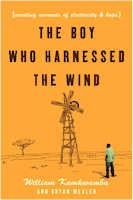
Basil is a dragon like no other. He is as small as a bird, green in colour and does not breathe fire. Born in Woodroot - one of the seven Realms that make up the roots of the Great Tree of Avalon - Basil longs to find out what and who he really is.
The novel is about Basil's journey of self-discovery, and by the end (or very near it) he discovers that (big) size does not matter - it's what you do that counts. In fact, his small size worked to his advantage at the most crucial moment.
While I liked the message that the story was trying deliver, the narrative disappointed me somewhat. Basil spends a long time whining and reflecting all by himself (in between being chased by various creatures), and it isn't until the middle of the novel that something really significant happens (i.e. he meets Merlin) - and then the pace slacks again. When he finally sets off on his journey across the realms, there is very little time and pages left, so Basil (and unfortunately his reader) is forced to rush through all the different places.
I also found the dialogue awkward - the author could not seem to decide which type of tone to use: modern 20th/21st century high school or Elizabethan middle ages/typical myth & legend. Granted, the book is targeted for children (age group 9-12) but that inconsistency is still jarring. All in all, this is one trilogy that I shall not finish - not in a hurry to find the related books.









